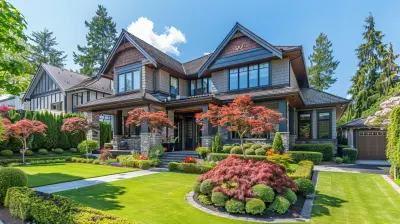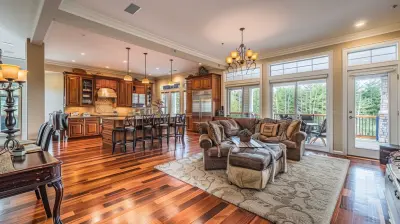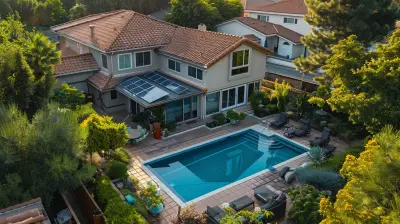28 December 2024
Selling a home is like trying to hit a bullseye on a dartboard while blindfolded—precision is key, but the process can feel overwhelming, especially in a competitive market. Price it too high, and buyers might scroll right past it like an overpriced vintage couch. Price it too low, and you risk leaving money on the table. So, how do you price your home just right to stand out in a sea of listings and still get top dollar?
Let’s grab a cup of coffee and dive into this step-by-step guide on how to master the art of pricing your home in a red-hot real estate market. By the time you’re done reading, you’ll feel like a seasoned pro, ready to slap a price tag on your property with confidence.
Why Getting the Price Right Matters
Imagine you’re browsing through an online shop and stumble upon a product that’s either way too expensive or almost suspiciously cheap. Odds are, you’re skipping it, right? Well, buyers do the same thing when shopping for homes.Overpricing can make your home sit on the market longer than stale bread. And we all know what happens to properties that linger for too long—buyers start wondering, “What’s wrong with it?” Underpricing, on the other hand, might attract attention, but not all attention is good. Low-ball pricing could mean fewer serious offers or even money lost when you could’ve gotten more.
The goal? Hit that sweet spot where buyers are intrigued, offers start rolling in, and you walk away happy.
Research, Research, Research!
1. Dive Into the Local Market
Pricing your home isn’t about what you think it’s worth—it’s about what buyers in your area are willing to pay. Start by studying similar homes in your neighborhood. These are often referred to as comparative market analyses (CMAs) or “comps.”Ask yourself:
- What are homes like mine selling for?
- How long have they been on the market?
- Did they sell for their asking price, or was there a price drop along the way?
Think of it this way: If your home is the same size and condition as your neighbor's house that sold for $500,000, pricing yours at $550,000 might feel like wishful thinking to buyers.
2. Understand Market Conditions
The real estate market isn’t static—it ebbs and flows like the tide. Is it a seller’s market, where demand is high and inventory is low? Or a buyer’s market, with lots of options and pickier shoppers? In a competitive market (often a seller’s market), buyers may be willing to pay more, but that doesn’t mean you should get reckless with pricing. Keep your finger on the pulse of how the market is behaving in your area.
How to Find Your Home’s Sweet Spot
3. Hire an Expert (Seriously, Do It!)
Sure, Zillow exists, and yes, anyone with a Wi-Fi connection can Google home prices. But online pricing tools often miss the nuances that only humans—specifically real estate professionals—can catch. They’ll factor in things like:- Upgrades you’ve made (hello, new kitchen cabinets!).
- The quality of your school district.
- Your home’s curb appeal.
An experienced real estate agent can give you an accurate range rather than a random guess. It’s like hiring a personal trainer instead of winging your workouts—you get way better results.
4. Don’t Rely Solely on Emotion
Let’s be real: Your home holds precious memories. Maybe it’s where you hosted family Thanksgiving for the first time or where your kids took their first steps. But memories don’t add monetary value (sorry, sentimental types). Try to separate your emotions from the numbers. Think of your home as a product you’re selling, not a chapter from your life story.
The Psychology Behind Pricing
5. The Power of “Charm Pricing”
Ever notice how things are priced at $499,000 instead of $500,000? That’s charm pricing at work. It taps into buyer psychology, making a price feel lower even if it’s not drastically different. Use this trick to your advantage when setting your home’s price.6. Create a Bidding War
In a competitive market, pricing slightly below market value can be a strategic move. Wait—doesn’t that contradict everything we just said? Hear me out. If your home is priced just under what buyers expect, it could trigger multiple offers, driving the price above your original asking price. It’s like creating buzz for a hot concert ticket—everyone suddenly wants in.Avoid These Common Pricing Pitfalls
7. Overpricing Because “You Can Always Lower It Later”
Technically, yes, you can drop your price if your home doesn’t sell. But every price reduction shrinks your pool of potential buyers. Plus, buyers might see the price drop as a red flag, thinking there’s something wrong with the property. First impressions matter, so aim to get it right the first time.8. Ignoring Online Search Behavior
Did you know that most buyers search for homes within specific price ranges? For example, a buyer might filter their search to only show listings between $400,000 and $450,000. If you price your home at $455,000, you might miss an entire segment of potential buyers simply because it didn’t show up in their search results.Tips to Make Your Home Worth Every Penny
9. Spruce It Up
A fresh coat of paint, clean carpets, and minor repairs can go a long way. It’s like putting on your best outfit for a job interview—first impressions count! Homes that look well-maintained often sell faster and for higher prices.10. Highlight Your Home’s Unique Features
Does your home have an extra-large backyard? A brand-new roof? Gorgeous natural lighting? Make sure your real estate listing highlights these selling points. Buyers will feel like they’re getting more bang for their buck.Testing the Waters
Don’t be afraid to test the market when pricing your home. Start with the most realistic price based on all the research, but keep a close eye on buyer feedback and activity. If your home doesn’t generate interest within the first couple of weeks, revisit your strategy. Think of it like tweaking a recipe—sometimes it takes a couple of tries to get it just right.Final Thoughts
Pricing your home in a competitive market doesn’t have to be a shot in the dark. With a little research, some strategic thinking, and a pinch of psychology, you can set a price that attracts buyers and boosts your chances of closing the deal at a price you’ll love. Remember, it’s all about finding the right balance—neither too high nor too low, but just right.Selling your home can be stressful, but the right price? That’s your golden ticket to a smooth and successful sale.












Zevonis McDonough
Pricing your home accurately in a competitive market is crucial. Research comparable sales, consider market trends, and seek expert advice. A well-priced home attracts serious buyers, minimizes time on the market, and maximizes your return. Strategy is key!
April 2, 2025 at 3:38 AM